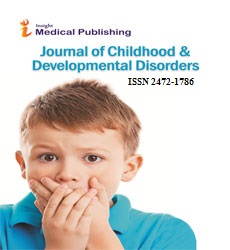Indications of Mental Issues Analyzed and it Causes
Jonathan K. Wynn
Jonathan K. Wynn*
Department of Psychiatry and Biobehavioral Sciences, University of California, Los Angeles, CA, USA
- *Corresponding Author:
- Jonathan K. Wynn Department of Psychiatry and Biobehavioral Sciences, University of California, Los Angeles, CA, USA, Email: jkwynn@ucla.edu
Received: December 01, 2021; Accepted: December 15, 2021; Published: December 22, 2021
Citation: Jonathan K. Wynn (2021) Indications of Mental issues analyzed and it causes. J Child Dev Dis Vol.7 No.12: 3.
Introduction
Adolescent psychiatric disorders are divided into two classes: adolescent issues and learning issues. These problems are usually diagnosed early in the early stages, in adolescence, or before adulthood, as they are widespread in DSM-IV-TR and ICD-10. The DSM-IV-TR covers ten categories of problems that include mental barriers, learning difficulties, motor skills problems, communication problems, general developmental disorders, attention problems and behavioral disorders, eating and eating disorders, Tic problems, dementia problems, and more. Problems of Childhood, Childhood, or Puberty.
Inability to read
The reason: Children's intellectual disabilities can be caused by genetic or genetic factors. A person may have a feature of cerebral palsy or pre- or post-pregnancy brain damage caused by overcrowding or severe brain damage, for example. About 30 and a half people who are illiterate will not know the reason for their determination even after a thorough investigation. The causes of birth defects include educational disabilities such as: Cytomegalovirus infections, toxoplasmosis, herpes, syphilis, rubella and human immunodeficiency infection.
• Maternal fever delayed in the first primester
• Exposure to anticonvulsants or alcohol
• Untreated maternal phenylketonuria (PKU)
• The severity of the rash, especially in newborns is surprisingly low in weight
• Postpartum pregnancy exposure lead
Single quality problems that result in illiteracy include:
• Soft X shape
• Neurofibromatosis
• Tuberous sclerosis
• Noonan's condition
• Status of Cornelia de Lange
Manifestation: As a child, a person with an educational disability could sit, sneak, or walk later than anything else in the right way. They may have difficulty speaking or find a way to talk late. Children who are illiterate are more likely to have difficulty learning how to train with a potty, to take care of themselves, to remember things, to think critically, and to have potentially dangerous repetitive behaviors. A few indications that a child with academic disability can be driven by child-like behavior, apathy, inability to meet educational needs, poor learning ability, and inability to meet appropriate educational goals. A few youths who are illiterate may develop coma, emotional problems, vision problems, or hearing problems.
Learning problems
Cause: Learning difficulties are accepted to be brought to the attention of the anomaly system. An anomaly can be in the formation of the brain or in the functioning of artificial compounds in the cerebrum. In line with these lines, individuals have difficulty accessing, managing or transmitting data in general. Specific objectives of the nervous system include complications during pregnancy, birth or early birth, brain damage in adolescence, exposure to toxins, and rashes.
Children with learning disabilities may exhibit traits related to:
• You experience reading difficulties for everyone to hear
• Have trouble spelling, articulating ideas as a hard copy, or reading a set of characters
• You experience difficulties in following the topics
• They may have difficulty understanding what they are reading
• You have difficulty remembering how to put words together
• They may have difficulty organizing their music to deliver what they want to say
• May misjudge or confuse pictures or math numbers
Open Access Journals
- Aquaculture & Veterinary Science
- Chemistry & Chemical Sciences
- Clinical Sciences
- Engineering
- General Science
- Genetics & Molecular Biology
- Health Care & Nursing
- Immunology & Microbiology
- Materials Science
- Mathematics & Physics
- Medical Sciences
- Neurology & Psychiatry
- Oncology & Cancer Science
- Pharmaceutical Sciences
